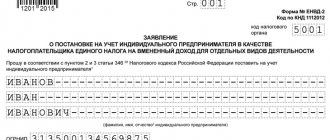The main document for persons engaged in entrepreneurial activities is the Tax Code. It specifies two forms of registration: legal entities and individual entrepreneurs. However, we often hear another abbreviation. So what is PBOYUL? This is a person who conducts business activities, but does not create an organization.
The decoding of PBOYUL fully reflects this definition (entrepreneur without legal entity formation). That is, a person has registered with specialized bodies, carries out his activities, and is responsible for the results.
IP and PYuOYUL: what is their difference
It is impossible to explain the difference between individual entrepreneurs and private entrepreneurs, since in fact there is none . Both abbreviations describe an entrepreneur who has registered but has not created his own company.
The difference in names is misleading, but this is only due to changes in legislation. Persons who have been operating for a long time may, out of habit, use outdated concepts, misleading potential entrepreneurs.
So if you are planning to open a business, then you should not delve into the old norms. In addition, experts admit that an individual entrepreneur is much simpler and more logical in terms of law. Previously, many were confused with abbreviations, believing that an entrepreneur could be a legal entity.
In addition to the abbreviation PBOYUL, another one was used - state of emergency. Which stands for private entrepreneur. This is the same entrepreneur, but with a different name. According to the new standards, he is equated to an individual entrepreneur.
Similarities and differences with IP
The definition of an individual entrepreneur is as follows: this is an entrepreneur who carries out his activities without forming a legal entity, that is, an individual entrepreneur and a private legal entity are the same thing . Since the second concept has long been abolished and was replaced by the concept of IP, it would be incorrect to talk about any similarities or differences.
Over the past 12-13 years, dozens and hundreds of amendments have been made regulating the work of entrepreneurs, so the rights and obligations of PBOLEs that once existed are strikingly different from the current ones related to individual entrepreneurs.
Old textbooks signed for publication before 2005 may still contain the old abbreviation, but such books are gradually removed from the libraries of educational institutions and replaced with new ones.
Today, the definition of “individual entrepreneur” is in common use; its position in the legal field is clearly and unambiguously defined. The same could not be said about the old concept, since entrepreneurs were called differently in different regions.
The lack of a clear definition led to the fact that round seals and official documents contained phrases that essentially said the same thing:
- PE – private entrepreneur;
- IChP – individual private enterprise;
- PBOYUL, IPBOYUL – an enterprise (individual) without forming a legal entity.
According to today's laws, this is impossible, since the name of the organizational and legal form must exactly correspond to the norm of the law. It should be made clear that the old acronym and all the concepts that were ever associated with it have now been abolished.
When was the PBOYUL cancelled?
In 2003, amendments were made to the law “On Registration of Legal Entities”. In this act, the concepts of PBOYUL and state of emergency were removed. Before this period, it was present in regulations, textbooks and registration documents.
In 2005, the concept of “individual entrepreneur”, which is relevant today, was introduced. This happened gradually: the Civil Code, then the Tax Code, and then other regulations. At the same time, a unified state register of individual entrepreneurs was created.
Already in 2004, they began to replace documents with Certificates of Registration. By the end of 2005 they were unified and replaced.
During the same period, there was a change in registration responsibilities. This function was transferred to the tax authorities. At each inspection, a unit was identified that was responsible for this function. In some regions, for example in Moscow, they are separated into a separate registration center, common to the districts. Previously, the administration of the subject of the Federation was considered the responsible person.
Individual entrepreneur or organization
One of the first decisions made when wanting to start a business is: individual entrepreneur or legal entity? Before making a choice, it is necessary to study the rights and responsibilities, advantages and disadvantages of each of them. Registering as an entrepreneur is much preferable for most . Here's why:
- simple registration and liquidation procedures, as opposed to closing the organization. There you will have to collect a package of documents and visit organizations and funds. And registering a legal entity is not easy, because you need a charter and the presence of all the founders in person, an office agreement;
- there is no need to create an authorized capital, you can start a business from scratch;
- application of simplified calculation procedures and taxes;
- freedom of action with the funds received, the ability to make additional infusions or withdrawals;
- there is no need for accounting, which means savings on hired labor;
- You don’t need an office to register; registration is enough. In this case, verifications are carried out on the territory of the tax authority;
- there is no need to open an account and no additional costs for its maintenance;
- The amount of taxes for the majority is significantly lower than for legal entities.
Although there is another side to the coin. It is not always possible to register as a legal entity. This directly depends on the activity, for example alcoholic beverages.
It is necessary to select the form of taxation in advance and submit an application to the Federal Tax Service in advance.
What are the disadvantages of IP
A number of disadvantages of this form of business as an entrepreneur are associated with certain limitations:
- ban on certain types of activities. This is a business related to the sale of alcohol. This requires a license issued only to legal entities;
- problems with lending. Of course, you can contact a bank, but looking for investors is more difficult. When two or three or more founders plan to operate, but register an individual entrepreneur, this leads to serious conflicts and financial losses;
- the entrepreneur risks all his property. This is one of the most “scary” factors. If you do not fulfill your obligations, you risk losing the property registered in your name. The exception according to the law is the only housing. If declared bankrupt by a court, the debt is repaid in a certain order at the expense of the property;
- pay contributions to the Pension Fund, even if there is no revenue;
- Unlike an enterprise, an individual entrepreneur cannot be sold. If you decide to change direction and transfer the matter to other hands, then, alas, this will not succeed.
Previously, cash deposits of entrepreneurs (for conducting business) were not included in the deposit insurance system. That is, it would not be possible to return the funds in the event of liquidation of the bank.
As of 01/01/2014, changes have been made, and now funds in the accounts of PBOYUL are insured.
PBOYUL and LLC
We have analyzed the decoding of the abbreviation PBOYUL. Let's now look at the advantages and disadvantages of this form of business registration (IP) in comparison with the usual LLC.
Advantages:
- Simplified procedure for both registering and closing your business. For example, opening an LLC is a rather difficult and lengthy procedure that takes energy, time, and nerves. An impressive set of documentation is collected, a charter is prepared, and a mandatory lease agreement is concluded to confirm the legal address. By opening an individual entrepreneur, you can do without all of the above.
- Simplified tax and accounting system. It is only necessary to reflect the completed transactions in the profit/expense book using the boiler method.
- The ability to manage your profits at your own discretion.
- To open a business, an individual entrepreneur does not need to make investments in the authorized capital.
- A simplified procedure for calculations and payment of tax contributions is also practiced.
Against the background of all of the above, significant disadvantages of the type of legal liability of the legal entity stand out:
- Response to obligations with all property (including personal property) that is registered to the businessman. While the founders of an LLC are responsible only to the extent of their share in the total authorized capital.
- Not all types of activities are available to individual entrepreneurs.
- Limitations on the number of employees.
Registration procedure
Registering for IPBOYUL is easy. Your goal is to be included in the Unified State Register of Entrepreneurs . Actions are prescribed in the current legislation. To do this, contact the registration authority at the tax service. Necessary:
- study OKVED, select suitable types of activities;
- collect the required documents;
- come to the tax office and submit these documents;
- choose a tax system;
- order a print;
- register with other funds.
The list of documents includes photocopying of passports, payment of state fees, application for registration and choice of regime. A TIN is required, but if you do not have one, one will be assigned during the registration process. Submit an application in person or by mail (a mandatory condition is that it should be sent not by regular letter, but with an inventory). If you do not want to go in person, it is acceptable to send a representative. To do this, you need to issue a notarized power of attorney and certify copies of documents. In terms of cost, this comes out to be quite expensive.
In 2020, a new clause was introduced into the registration legislation. Now a person does not have to contact the tax department on his own. The necessary documents can be handed over by a notary. He formalizes them using telecommunications routes.
You can also obtain a certificate and other documentation from a notary.
Or use the software. The service for submitting applications via the Internet will allow you to send any application: for registration, closure of an individual entrepreneur, changes. To register as an entrepreneur, a person must be legally capable, of legal age and not have any injunctions. Russian citizenship is also not a mandatory factor. It is acceptable to have the necessary permits (residence permit).
Completing an activity is also a simple procedure . It occurs at personal request by filing an application, the death of a person, or by a court decision (bankruptcy, the document giving the right to reside in the Russian Federation has expired).
Taxes for entrepreneurs
For private legal entities or, in a new way, individual entrepreneurs, any tax accounting systems are available. The main thing is to meet the necessary criteria in the by-laws:
- upon registration, everyone automatically falls into the general taxation system with VAT, personal income tax;
- simplified system. Your revenue during the year should be within 60 million rubles, then you can pay 6% of it or 15% minus expenses;
- patent. The most attractive system, in which there is no need even to provide reporting, and the types of activities, conditions, and limit revenues are individual for each entity,
- approved by acts;
- agricultural is suitable for those involved in the production of agricultural goods;
- Imputation or UTII is suitable for certain areas of activity.
Depending on your choice, you will have to pay taxes: VAT, personal income tax, property tax, profit tax, water tax, excise tax. It is recommended to choose a specific type during registration and submit an application at the same time. In this case, you will be on that taxation system from the first day of registration.
What taxes does PBOYUL pay?
A PBOYUL can choose the taxation system that seems most convenient to it, if it meets the criteria established by law:
- General system is the default.
- Simplified tax system – the choice of a simplified tax regime is possible if annual revenue does not exceed 60 million rubles.
- Simplified tax system based on a patent - you can switch to this tax regime only in certain cases. If the patent system operates in the region where the PBOLE is located. And also if the entrepreneur is engaged in certain types of activities, and his staff and revenue do not exceed the limits established by law.
- Unified Agricultural Tax – this system applies exclusively to agricultural producers.
- UTII - this tax is paid only by entrepreneurs working in certain areas.
On video: Just about personal finance – 4. Do I have to pay taxes?
PBOYUL is not exempt from paying a number of taxes that apply to legal entities.
A business entity is obliged to transfer to the budget:
- VAT at 20%;
- Personal income tax of 13% and insurance premiums. If an entrepreneur has employees, then he acts as a tax agent and transfers personal income tax to the budget for them;
- Property tax (if the property is registered to it);
- Income tax of 24%;
- Other taxes (for example, excise taxes if he sells excisable goods, water tax if he uses water resources in his activities).






